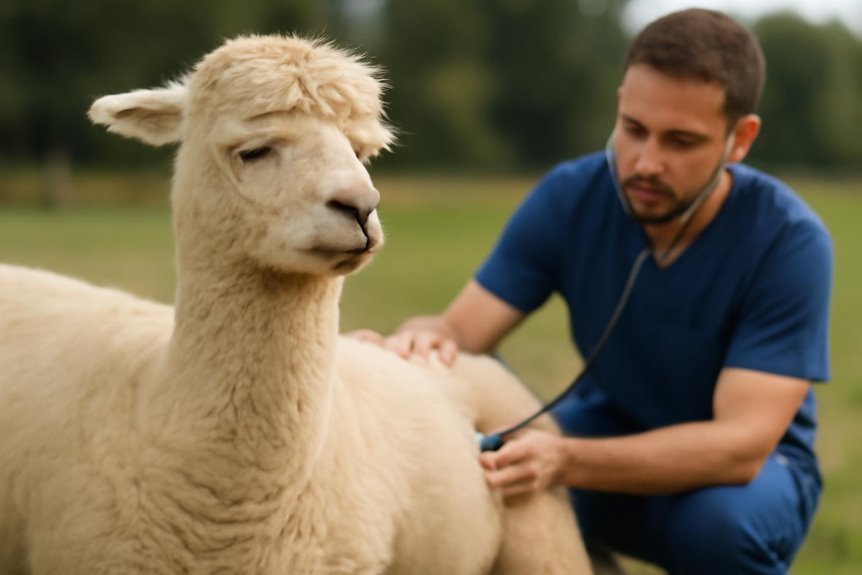Why Do Alpacas Show Digestive Problem Signs?
You might notice your alpaca showing digestive problems due to factors like diet changes, stress, parasites, or infections that upset their gut health. Stress and poor-quality food can cause issues like constipation or colic, while parasites and bacteria trigger diarrhea or weight loss. Inflammation from conditions like eosinophilic enteritis also plays a role. Understanding these causes helps you spot signs early and manage their health effectively. There’s more to explore about what to watch for and how to help.
Key Takeaways
- Dietary changes, poor-quality forage, or rapid consumption can disrupt alpacas’ digestion, causing constipation, colic, or diarrhea.
- Parasitic infections like Eimeria macusaniensis and nematodes cause intestinal inflammation, weight loss, and altered fecal consistency.
- Stress elevates cortisol, leading to gastric ulcers, reduced gut motility, and compromised nutrient absorption in alpacas.
- Infectious agents such as bacterial enteritis, clostridial diseases, and viral infections trigger gastrointestinal distress and abnormal mucus membranes.
- Behavioral changes like reduced appetite, lethargy, and isolation often signal underlying digestive problems in alpacas.
Common Causes of Digestive Issues in Alpacas

While you might not expect it, alpacas can suffer from digestive problems caused by several common factors. Dietary changes and consuming fibrous feed that isn’t chewed properly often lead to constipation or intestinal obstruction, causing abdominal discomfort. Infectious disease is another key culprit; for example, Eimeria macusaniensis infection frequently results in enteritis, bringing diarrhea and digestive system upset. Bacterial enteritis, often secondary to other infections, can cause fever and abnormal mucus membranes, signaling serious digestive involvement. Additionally, ingestion of toxic plants like Oleander or Foxglove triggers severe gastrointestinal distress, requiring immediate care. Even conditions like ulcerative pododermatitis, though not directly in the digestive system, can impair grazing and worsen digestion. Knowing these common causes helps you recognize and address alpaca digestive issues promptly.
The Impact of Stress on Alpaca Digestion
Because stress can dramatically affect their digestive systems, you need to recognize how factors like heat, sudden diet changes, or social disruptions impact your alpacas. Stress triggers increased cortisol levels, which disrupt gut motility and can cause gastric ulcers or constipation. Environmental changes, especially inadequate shelter during extreme weather, reduce food intake and lead to colic signs. Elevated stress also causes hyperglycemia, further compromising digestive health and nutrient absorption. Although diarrhea is rare in adult alpacas, stress-induced gastrointestinal disturbances often manifest as colic. To protect your alpacas, maintain stable environments and consistent routines. Regular health checks and stress management, including proper husbandry and vaccinations, are essential to prevent digestive issues linked to stress and keep your alpacas healthy and comfortable.
Dietary Factors Contributing to Gastrointestinal Disturbances
If your alpacas consume poor-quality forage or too much fibrous feed, they could face constipation or fecal impaction. Dietary factors play a major role in gastrointestinal disturbances. You should watch out for:
- Abrupt dietary changes that upset their digestive system, causing diarrhea or colic.
- Feeding rapidly digestible carbohydrates, which disrupt gut balance and may lead to colic.
- Insufficient chewing or allowing rapid consumption of pellets, increasing the risk of choke or blockages.
- Failure to provide adequate high-fiber diets, which are essential for proper gut motility and preventing digestive issues.
Infectious Agents Affecting Alpaca Gut Health

Though dietary factors are critical, you can’t overlook infectious agents when it comes to alpaca gut health. Pathogens like Eimeria macusaniensis can cause enteritis, leading to diarrhea and abdominal discomfort. Bacterial infections from Yersinia pseudotuberculosis and Salmonella species often result in severe gastrointestinal issues. For young alpacas, infectious agents such as rotavirus, coronavirus, and enteropathogenic Escherichia coli are common causes of neonatal diarrhea, making early monitoring essential. Clostridium perfringens types C and D pose a rapid threat, especially under stress, so vaccination plays a key role in prevention. Additionally, stress-related infections like alpaca fever from Streptococcus zooepidemicus can worsen digestive problems. Understanding these infectious agents helps you manage and protect your alpacas’ gut health effectively.
Parasitic Infections and Their Role in Digestive Problems
You’ll want to watch out for common parasites like Eimeria macusaniensis and Haemonchus contortus, which can cause diarrhea, weight loss, and anemia in alpacas. Recognizing symptoms such as colic and lethargy early on is key to preventing serious digestive issues. Regular fecal exams and timely deworming are essential steps to keep your alpaca healthy and parasite-free.
Common Parasites Identified
Because parasitic infections are a common cause of digestive problems in alpacas, recognizing the parasites involved is key to managing their health. You’ll often encounter these common parasites contributing to digestive problems:
- Eimeria macusaniensis – a primary cause of enteritis, leading to diarrhea and weight loss.
- Nematodes – gastrointestinal worms that cause malabsorption and protein-losing enteropathy.
- Other coccidia species – which can also disrupt intestinal function.
- Larval stages of parasites – detectable through fecal exams, critical for targeted treatment.
Understanding these parasites helps you catch infections early and apply effective deworming protocols, preventing severe digestive complications. Regular fecal examinations are your best tool to identify these parasites and keep your alpacas healthy.
Infection Symptoms Overview
Recognizing the parasites affecting your alpacas is just the first step; understanding the symptoms they cause will help you spot infections early. Parasitic infections, especially from Eimeria macusaniensis and nematodes, often lead to digestive problems like diarrhea and enteritis. You might notice symptoms such as lethargy, reduced appetite, and significant weight loss, all signaling that your alpaca’s digestive health is compromised. Severe infestations can cause protein-losing enteropathy, worsening malnutrition and digestive dysfunction. Additionally, these infections can pave the way for secondary bacterial issues, making symptoms more complex. To catch these problems early, regular fecal exams are vital. By staying alert to these symptoms, you can guarantee your alpacas receive timely attention before digestive problems worsen.
Prevention and Treatment
Although parasitic infections in alpacas can be challenging to detect early, regular fecal exams and tailored deworming protocols are your best defenses against digestive problems caused by parasites like Eimeria macusaniensis and Haemonchus contortus. For effective prevention and treatment, consider these steps:
- Schedule routine fecal tests to catch infections before symptoms appear.
- Use dewormers specific to your region and your alpaca’s age to maximize effectiveness.
- Implement pasture rotation to reduce exposure to parasite eggs and larvae.
- Provide nutritional support to strengthen your alpaca’s immune system and aid recovery from protein-losing enteropathy.
Recognizing Symptoms of Digestive Disorders in Alpacas
You’ll want to watch for common digestive symptoms like abdominal discomfort, unusual rolling, or changes in how your alpaca interacts with the herd. Behavioral shifts such as self-isolation or decreased appetite can also signal trouble. Catching these signs early helps you address digestive issues before they worsen.
Common Digestive Symptoms
When your alpaca shows signs like abdominal discomfort, colic, or changes in fecal output such as diarrhea or constipation, it’s important to take notice. These common digestive symptoms can signal underlying issues requiring prompt attention. Watch closely for:
- Abdominal pain and distension—look for a pot-bellied appearance indicating possible obstruction.
- Changes in appetite—reluctance to eat or abnormal grazing behavior often hint at digestive distress.
- Signs of distress—self-separation, groaning, or teeth grinding, as alpacas tend to hide pain.
- Altered fecal output—diarrhea or constipation may indicate gastrointestinal imbalance or infection.
Recognizing these symptoms early helps you intervene before problems worsen. Keep a close eye on your alpaca’s condition to guarantee timely care.
Behavioral Changes Indicators
If your alpaca starts acting differently, such as separating from the herd or showing less interest in food, it could be a sign of digestive trouble. Behavioral changes like reluctance to eat or a sudden drop in appetite are key signs that something’s wrong. You might also notice unusual vocalizations, like groaning or teeth grinding, which indicate discomfort. Pay close attention to the dung pile as well—fewer droppings or changes in fecal consistency can reveal digestive issues. Even aggressive alpacas may become more submissive when unwell. Recognizing these behavioral changes and signs early helps you address digestive problems promptly, ensuring your alpaca gets the care it needs before complications develop.
The Role of Eosinophilic Enteritis in Alpaca Digestive Health
Although eosinophilic enteritis is a less common digestive issue in alpacas, it can seriously affect their health by causing inflammation in the intestinal lining. This gastrointestinal condition triggers various clinical signs that you might notice, such as weight loss, diarrhea, and colic. Since these symptoms resemble other digestive problems, identifying eosinophilic enteritis can be tricky. Here’s what you should know:
Eosinophilic enteritis in alpacas causes intestinal inflammation with symptoms like weight loss, diarrhea, and colic, making diagnosis challenging.
- It involves an increased number of eosinophils causing intestinal inflammation.
- Its exact cause is unclear but may relate to diet, parasites, or hypersensitivity.
- Diagnosis requires specialized tests like biopsies to detect eosinophilic infiltration.
- Treatment typically includes corticosteroids and dietary management to reduce inflammation and prevent recurrence.
Understanding these points helps you respond promptly to your alpaca’s digestive health needs.
Diagnostic Techniques for Identifying Digestive Problems

How can you accurately identify digestive problems in your alpaca? Effective diagnostic techniques include fecal examinations to detect parasites like Eimeria macusaniensis, a common cause of enteritis. Ultrasound and succussion help assess gut fluid distention and reveal gastrointestinal abnormalities. Abdominal palpation is essential, especially in full-fleeced alpacas, since behavioral signs of cranial abdominal pain can be subtle. Blood tests showing hypoalbuminemia and electrolyte imbalances indicate the severity of digestive issues such as colic. Additionally, monitoring appetite changes and fecal consistency is critical—normal appetite may suggest mild or non-gastrointestinal problems, while decreased appetite or altered fecal passage often signals significant digestive distress. Combining these methods guarantees a thorough evaluation of your alpaca’s digestive health.
Preventative Measures for Maintaining Alpaca Gastrointestinal Health
Accurately diagnosing digestive problems in your alpaca is just one part of maintaining their health. To prevent issues, focus on these key measures:
- Regularly monitor body condition scores, aiming for 2.5 to 3 in non-pregnant adults to avoid malnutrition-related problems.
- Provide a high-fiber diet with adequate roughage to promote proper digestion and reduce constipation risk.
- Guarantee constant hydration, especially in warm weather, to prevent dehydration and heat stress that affect gut health.
- Schedule routine health checks to catch early signs of gastrointestinal distress since alpacas often hide symptoms.
Treatment Options for Alpaca Digestive Disorders
When your alpaca faces digestive issues, medications and therapies like pain relief and hydration are essential to managing symptoms. Adjusting their diet can also help prevent and treat certain problems. In more serious cases, timely veterinary intervention is vital to guarantee the best outcome.
Medication and Therapies
Although alpaca digestive disorders can be complex, effective medication and therapies are available to manage common issues like constipation, diarrhea, and gastric ulcers. Proper administration is key to successful treatment. Here are some common approaches:
- Constipation is treated with muscle relaxants, pain relief, and mineral oil to ease fecal passage and reduce discomfort.
- Diarrhea requires supportive care and may involve changing pasture to avoid toxic plants or treating infections.
- Gastric ulcers need stress reduction combined with supportive therapies based on clinical signs and history.
- Persistent hyperglycemia in very sick alpacas may require regular insulin administration with careful glucose and sodium monitoring.
Using these targeted medication and therapies helps you manage your alpaca’s digestive disorders effectively and improve their well-being.
Dietary Management Strategies
Since diet plays an essential role in alpaca digestive health, managing what and how they eat is one of the most effective treatment options for digestive disorders. Effective dietary management includes providing a high-fiber diet mainly consisting of quality hay and pasture to support healthy rumen function and prevent constipation. You should regularly monitor your alpaca’s body condition score, aiming for 2.5 to 3 in non-pregnant adults, adjusting feed to avoid obesity-related issues. Incorporating probiotics can also enhance gut health by maintaining a balanced microbial environment, aiding recovery from digestive upsets. Additionally, avoid sudden diet changes; introduce new feeds gradually to reduce risks of colic or diarrhea. Don’t forget to guarantee fresh, clean water is always available, as hydration is critical to digestion and avoiding complications.
Veterinary Intervention Necessity
If you notice your alpaca showing signs of digestive distress, veterinary intervention is crucial to prevent serious complications. Early veterinary consultation can help identify digestive disorders like gastrointestinal obstruction, which may be life-threatening without prompt care. Treatment options vary depending on severity and may include:
- Supportive care with intravenous fluids to maintain hydration.
- Pain management using analgesics for relief.
- Medical therapies such as anti-inflammatories or muscle relaxants to restore function.
- Surgical intervention for severe cases like strangulation or intussusception.
Diagnostic tools like fecal exams, ultrasounds, and blood tests are essential to pinpoint the cause, including infections. Acting quickly guarantees better prognosis and reduces the risk of fatal outcomes, making timely veterinary intervention critical for your alpaca’s health.
Frequently Asked Questions
What Is the Stomach Problem With Alpacas?
Think of your alpaca’s stomach as a delicate orchestra; if dietary imbalance strikes, it may cause stomach bloat, acid reflux, or intestinal blockage. You’ll notice discomfort, so managing their diet carefully keeps harmony and health intact.
What Are the Symptoms of Thiamine Deficiency in Alpacas?
You’ll notice alpacas with thiamine deficiency show ataxia, lethargy, and digestive issues. Deficiency causes include poor thiamine sources. Treatment options involve supplementation, while prevention strategies focus on proper diet and monitoring to avoid neurological damage.
What Are the Symptoms of Worms in Alpacas?
You’ll notice worms cause weight loss, diarrhea, and colic signs in alpacas. To protect them, focus on worm prevention, parasite management, proper alpaca nutrition, and attentive digestive care to keep your herd healthy and thriving.
What Are the Symptoms of Coccidiosis in Alpacas?
You’ll notice diarrhea, abdominal discomfort, and lethargy in alpacas with coccidiosis. Prompt coccidiosis treatment is crucial to protect alpaca health, support digestive health, and guarantee effective parasite prevention through regular fecal exams and care.







Our picks
Alpaca & Wool Felted Sole Inserts: Comfy Upgrade?
Best Alpaca Socks for Hiking: Ultimate Comfort and Durability on Trails
Best Alpaca Halter for Comfort and Control